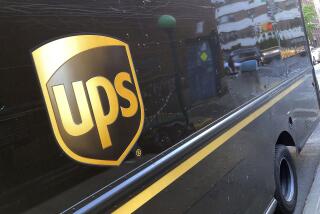UPS Begins Effort to Win Back Clients
- Share via
United Parcel Service of America on Tuesday launched the arduous task of winning back the confidence of millions of customers whose daily routines were disrupted by the two-week Teamsters strike, an effort even UPS conceded won’t prevent the permanent loss of about 5% of its pre-strike volume.
“We’re going to be a smaller company,” said UPS spokesman Mark Dickens. “Undeniably there is business we have lost altogether.”
As UPS prepares to again send its fleet of familiar brown trucks out in force today, some of its rivals are bracing for the giant shipper to slash prices for lucrative accounts it wants to recapture.
“We anticipate UPS will launch a rather aggressive initiative to regain some of the market share they lost,” said David Fonkalsrud, a spokesman for competitor DHL Worldwide Express.
UPS, with revenue of $22.4 billion last year, declined to disclose any “incentive” plans it might have. But a systemwide price cut for all customers is unlikely, analysts predicted. The Teamsters, meanwhile, pledged to help UPS win back as many customers as possible, customers who had to scramble to find alternatives when the strike all but shut down UPS ground service. Before the strike, the company handled about 12 million packages a day. During the strike, it’s estimated that volume was cut to 1.2 million packages.
“We’re going to be asking our members to reach out to customers, to reassure them that everything is fine and encourage that business to come back,” said Teamsters spokeswoman Nancy Stella. The union represents 185,000 UPS employees, or about 55% of the company’s domestic work force.
To be sure, observers expect UPS to regain most of the customers it lost to other shippers simply because the company and its ground delivery network dominate the business. The company--with nearly 160,000 trucks and other vehicles and 529 aircraft--controlled about 70% of the domestic package business when the strike hit.
Many of UPS’ big clients also are locked into long-term contracts with the Atlanta-based shipper. Examples: Catalog retailers Lands’ End Inc., Lillian Vernon Corp. and Spiegel Inc.
“We’ll be going back to them,” said David Hochberg, a Lillian Vernon vice president.
Even so, UPS and some of its rivals said the enormous inconvenience caused by the walkout will markedly change the dynamics of the $65-billion package-shipping industry.
Before the strike hit, UPS and other industry players had tried to sell customers on the benefit of giving all their package business to one shipping company, whether it was domestic or overseas, overnight or deferred delivery, on ground or by air.
After enduring the UPS mess, that “bundling” of services is seen by some customers as a liability. That gives UPS competitors an opportunity to grab business from UPS permanently, a development UPS doesn’t dispute.
“At the very least, a good portion of our customers are going to want to diversify their shipping services,” Dickens said.
Case in point: Bergen Brunswig Corp., the giant medical products distributor based in Orange. The company is letting Federal Express Corp. keep some of the business that formerly went to UPS, said Bergen Brunswig spokeswoman Lisa Riordan.
Overall, UPS will probably “go through significant customer by significant customer and see who hasn’t come back,” before deciding whether to offer them price cuts to return, said Robert Schulz, a credit analyst at Standard & Poor’s Corp.
RPS Inc., a Pittsburgh-based unit of Caliber System Inc. that ranks a distant second to UPS in ground deliveries, believes lower prices still wouldn’t be enough to win back some customers, said RPS President Ivan T. Hofmann.
“During the strike, I had too many customers call me and say price was irrelevant,” said Hofmann. He expects many will “rethink” the wisdom of having a sole shipper. “The experience that customers have just gone through puts us in a good position,” he said.
Federal Express declined to speculate on what UPS might do to regain market share in the air delivery sector--or how it might respond to those actions. But FedEx said it will seek to keep some of the business that spilled over from the strike.
“We’re not going to be shy about talking to customers about our possibilities,” said spokeswoman Sally Davenport.
UPS also has the huge task of healing the wounds between management--which served as a skeleton crew during the strike--and its other employees, a task the company doesn’t expect to be easy.
“We’ve never had a nationwide strike; this is new territory for us,” Dickens said. “Strikes tend to bring out the worst in everybody and a lot of bad blood develops.
“We’ve just got to develop and promote a spirit of healing within the organization and put everything behind us,” he added. “But some bridges have been burned, unfortunately.”
Staff writer Barbara Marsh in Orange County and Times wire services contributed to this report.
MORE UPS COVERAGE: A1, A12
More to Read
Inside the business of entertainment
The Wide Shot brings you news, analysis and insights on everything from streaming wars to production — and what it all means for the future.
You may occasionally receive promotional content from the Los Angeles Times.











